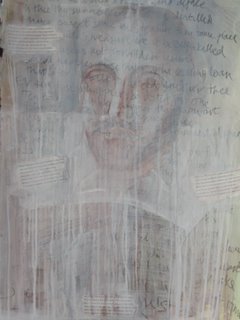

Images and divinations to incite insight


 This painting is one in a series of six inspired by Chinese calligraphy. The underlying ideogram (executed in sumi ink) poses a basic concept. Ink spatters and successive overlays of red tones in acquarelle pencil and water colour problematize the strength and durability of the central motif, without ever succeeding in totally obscuring it.
This painting is one in a series of six inspired by Chinese calligraphy. The underlying ideogram (executed in sumi ink) poses a basic concept. Ink spatters and successive overlays of red tones in acquarelle pencil and water colour problematize the strength and durability of the central motif, without ever succeeding in totally obscuring it.
In one of thine, from that which thou departest;
And that fresh blood which youngly thou bestowest
Thou mayst call thine when thou from youth convertest.
Herein lives wisdom, beauty and increase:
Without this, folly, age and cold decay:
If all were minded so, the times should cease
And threescore year would make the world away.
Let those whom Nature hath not made for store,
Harsh featureless and rude, barrenly perish:
Look, whom she best endow'd she gave the more;
Which bounteous gift thou shouldst in bounty cherish:
She carved thee for her seal, and meant thereby
Thou shouldst print more, not let that copy die.
XII.
When I do count the clock that tells the time,
And see the brave day sunk in hideous night;
When I behold the violet past prime,
And sable curls all silver'd o'er with white;
When lofty trees I see barren of leaves
Which erst from heat did canopy the herd,
And summer's green all girded up in sheaves
Borne on the bier with white and bristly beard,
Then of thy beauty do I question make,
That thou among the wastes of time must go,
Since sweets and beauties do themselves forsake
And die as fast as they see others grow;
And nothing 'gainst Time's scythe can make defence
Save breed, to brave him when he takes thee hence.